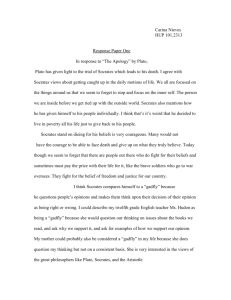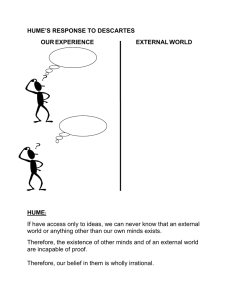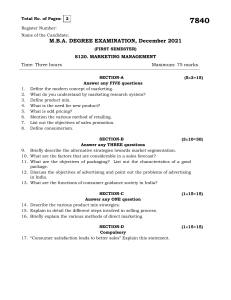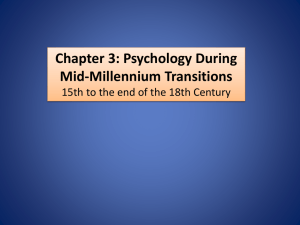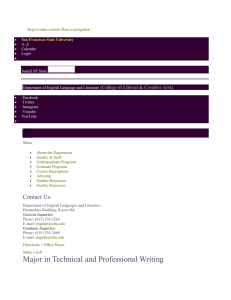Carina Nieves HUP 101.2313 Professor Macomber
advertisement
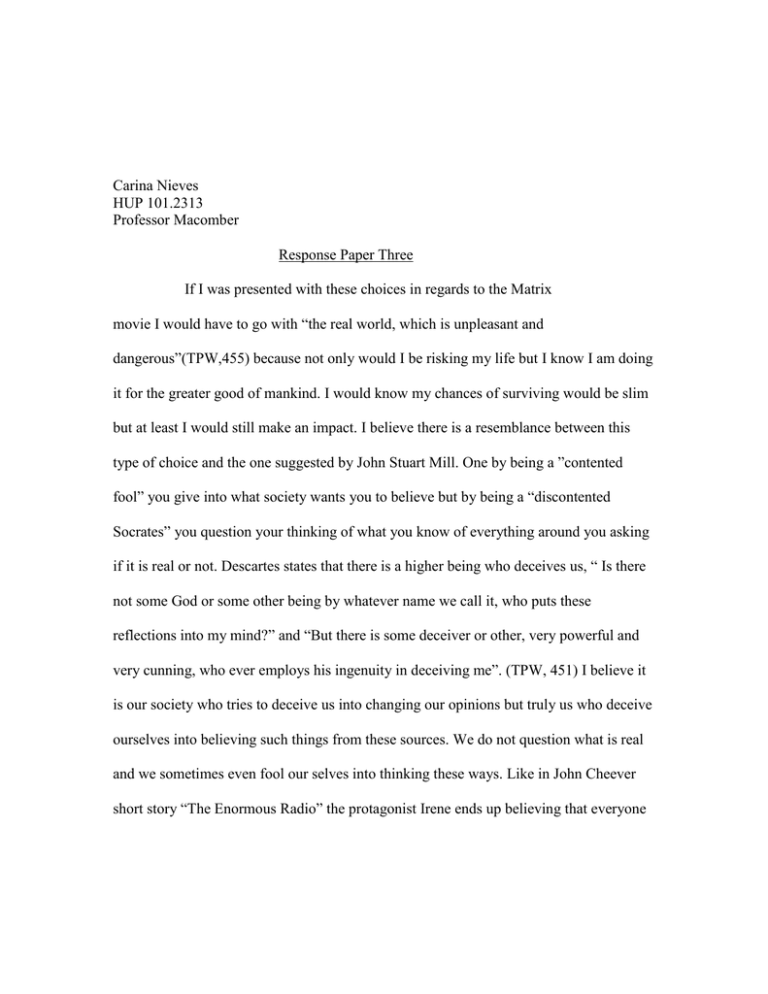
Carina Nieves HUP 101.2313 Professor Macomber Response Paper Three If I was presented with these choices in regards to the Matrix movie I would have to go with “the real world, which is unpleasant and dangerous”(TPW,455) because not only would I be risking my life but I know I am doing it for the greater good of mankind. I would know my chances of surviving would be slim but at least I would still make an impact. I believe there is a resemblance between this type of choice and the one suggested by John Stuart Mill. One by being a ”contented fool” you give into what society wants you to believe but by being a “discontented Socrates” you question your thinking of what you know of everything around you asking if it is real or not. Descartes states that there is a higher being who deceives us, “ Is there not some God or some other being by whatever name we call it, who puts these reflections into my mind?” and “But there is some deceiver or other, very powerful and very cunning, who ever employs his ingenuity in deceiving me”. (TPW, 451) I believe it is our society who tries to deceive us into changing our opinions but truly us who deceive ourselves into believing such things from these sources. We do not question what is real and we sometimes even fool our selves into thinking these ways. Like in John Cheever short story “The Enormous Radio” the protagonist Irene ends up believing that everyone will hear her conversation with her husband when in truth it is she who deceives herself to believe such a radio exists, “Please Jim, she said. Please. They’ll hear us. The radio”. (Major Writers of Short Stories, 250) Descartes explains that we are dependent on our senses that we are easily fooled, “Am I dependent on body and senses that I cannot exist without these?”(TPW, 451) Yet he also states that we are desired to find the truth yet we fear the outcome of what we might discover,” Desirous of finding the truths, yet fearful of what we might discover”. (TPW, 451) I agree that things that are represented in our sleep are representations of what we do think in our minds. My 12th grade English teacher once said that” Our dreams are just thoughts from the day”. Descartes states” At the same time we must at least confess that the things which are represented to us in sleep are like painted representations which can only have been formed as the counterparts of something real and true, and that in this way those general things at least, i.e. eyes, a head, hands, and a whole body, are not imaginary things but things really existent. (TPW, 447) Carina Nieves HUP 101.2313 Professor Macomber Response Paper Four I agree with the text that in the beginning John Locke has a very good view against rationalism. Locke has made a valid opinion that children and idiots have innate ideas. Also he states that “If therefore children and idiots have souls, have minds…” (TPW, 462) I think even if someone is an idiot that they have a soul and a mind but since they are an idiot they don’t use their mind for knowledge. In the case of children, maybe it is true that they haven’t activated this use of “potential knowledge”, but I have another view to this statement. Maybe since children are still young and they are learning new ideas about everything thus their knowledge is being built up and when they get to an age they will begin to have a better understanding of questioning if what they learned is true. Like in my second response paper I agreed with Aristotle that a person’s soul dies with their body and that your spirit lives on. Everyone has a soul within their body that is their’s to keep but a person may not have a spirit. A reason for this is, is due to them not having faith in a God. A person’s spirit doesn’t belong to them but to God so when they die their spirit goes back to God. I don’t agree with Locke’s belief that it is contradictory to believe that we might possess knowledge of which we are unaware of. I think that we have this “potential knowledge” but many of us don’t use it or may not choose to use it mainly due to internal and external obstacles that prohibit us to use of this knowledge. We choose whether or not to use it. According to the text “We develop opinions through the simple experience of living and observing the world. But these opinions reflect the transitory nature of human life and so can never achieve the status of universal knowledge. Such knowledge only comes from knowledge of the eternal forms, through our ability to use our reasoning abilities”. (TPW, 422) If we only base our knowledge solely on our opinions and not our reasoning skills then we will never come to define what we know. Carina Nieves HUP 101.2313 Professor Macomber Response Paper Five According to Hume’s philosophical beliefs, he believes that It is impossible for us to ever have a certain knowledge of the principle of cause and effect. Hume believes that we discover cause and effect not by reason, but by experience. He divides the “division of human knowledge into relations of ideas and matters of fact”. (TPW, 479) His goal is to prove according to his division of human knowledge that cause and effect can neither be understood by experience or knowledge. I agree with Hume’s reasoning on cause and effect because sometimes even though if we use experience or knowledge the turn out will be different due to obstacles that we have no power over controlling. Some of them are natural causes and human causes. Natural causes sometimes are caused by human causes. For example the lets take the topic of global warming. We humans know we are the cause of destroying the Earth and we know we can stop it, but we know the effects but we don’t know when they will occur. According to Hume” Nature will always maintain her rights, and prevail in the end over any abstract reasoning whatsoever.”(TPW, 484) I don’t happen to understand what Hume means by “casual event”. (TPW, 481) Carina Nieves HUP 101.2313 Professor Macomber Response Paper Six The reason why many regard Kant as the greatest philosopher of modern period is because he tried to combine the theories of rationalism and empiricisim together to argue that both are important to the thinking process as he states that” unity of consciousness” was his goal. (TPW,485) The reason why I think the concept of “perceiving lenses” is a useful and creative metaphor in illustrating the way in which we actively constitue our world is because we all have our own perception the world around us. It’s like what Socrates says about the people of Athens that they are “sleepwalking through life”, in which he is really describing the whole world not just Athens. I agree with Kants’ views on how we perceive the world by combining it with our own experiences and then synthesizing and understanding what we learned. We all view things in different ways but it all is determined by many factors like where we grew up and what we were exposed to. Our minds could be actively thinking about ideas on the world or we could just be stuck in the time warp of our own world , where we don’t see outside the box. The choice is ours to make but as my mom told me about philosphy”It is boring now because it doesn’t apply to you now but it will in your future”. Carina Nieves HUP 101.2313 Professor Macomber 11/5/07 Response Paper Seven I agree Plato’s idea that the body belongs to the the Physical realm and that they are imperfect, change, and die but I don’t agree with his idea of the soul. On page 94 it is said that Plato cites the views of the female philosopher Diotima in his diologue “The Symposium”. “And not only his body, for the same things happens to his soul. And neither his manners, nor his dispositions, nor his thoughts, nor his desires, nor his pleasures, nor his sufferings, nor his fears, are the same throughout his life, for some of them grow, while others disappear.”(TPW 94) I happen to agree with Diotima that the soul changes as you change when you become older. A person’s soul at a young age is certainly undeveloped and will over a period of time start to develop as they mature. With every obstacle that we face in life whether it is marriage or the death of a parent. Our souls change to fit the person we become from facing these difficulties in life. I diagree with Plato overemphasizing the power and authority of reason over body and emotions.Woman certainly are able to have superior capacity of reason just like men and not just physical responses and emotions. Men also have physical responses and emotions too so these ideas don’t fit the into the thinking of todays modern world. There are many great women leaders out there throughout the world that have been responsible for many achievements that have been made. In response to the questions being asked for home work I can’t recall an experience in my life that I can identify with the questions being asked but I can come up with a different experience that doesn’t include Physical Appetite. I remember when I was a senior at Richmond Hill High School last year and I was applying for scholarships I remember I was mad about not getting the $1,000 but $600 scholarship from the local Kiwanis Club who supports my Key Club. I was mad because I thought that since I knew all of them very well that they would give me the big scholarship money but I was wrong. I guess I had (Passion) the ambition of winning but I knew that I had to just be grateful (Reason) that I had won a scholarship from them in the first place. Carina Nieves HUP 101.2313 Professor Macomber 11/12/07 Response Paper Eight Locke’s claim of your conscious not attached to any particular body or substance makes sense. I agree with Locke’s view on this idea. Locke makes a good point with his example of having your little finger by an accident and that you are still your self but now your physical identity is different because you a missing a little finger on one of your hands. I believe that our conscious self is within our mind and we use our mind and our senses to understand whether or not we are aware of what we are doing. At times we may not be aware of what we are doing because we sometimes zone out or daydream causing us to loose our focus. I disagree with Descartes that the mind is seperate from the soul but also but I also that it is governed by Gods will. With the mind I think it is part not a material thing but it still is part of your body, part of your brain. Your body wouldn’t be able to think if we didn’t have a mind which helps us to understand everything around us. The mind in my opinion shouldn’t be governed by Gods will but your own will because it is our own will which decides whether or not to think the way we do. If we are religious being we may think that our beliefs are part of Gods will for us to follow him. With Hume I agree that ideas and images are built up from primary impressions but I disagree because ideas can be made up by our mind and not come soley from our perceptions of the world. I agree with the Buddhist belief that the “self” is comprised of different elements. Our “self” is not a fictional being like Hume refers it to be. Our “self” is made up of different aspects of ourself just like the Buddhist philosophy reveals”The self is composed of five aggregates: physical form, sensation, conceptualization, disposition to act, and consciousness”(TPW,119). I agree that all these things play a part in the personal identity that we make for ourself and that over time it does change. We do have an identity and things things make up who we are and that gives us an identity that people will go by.
